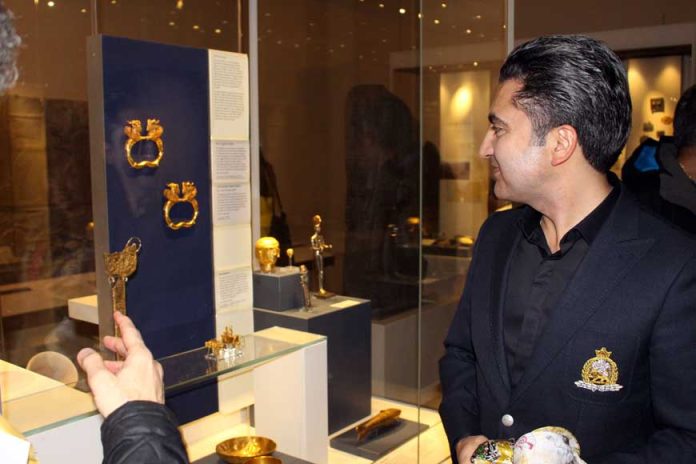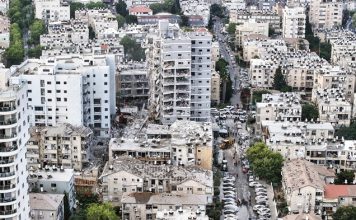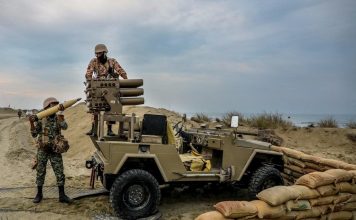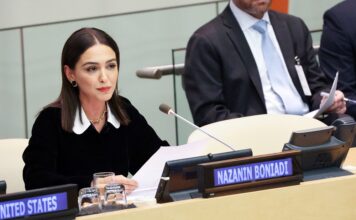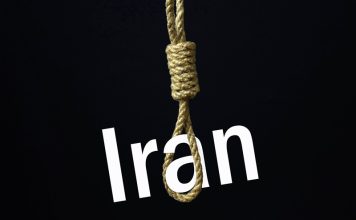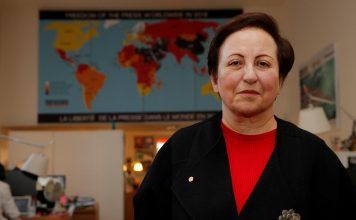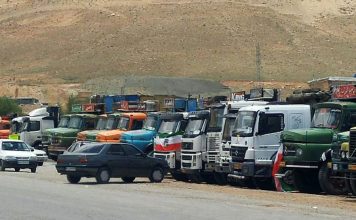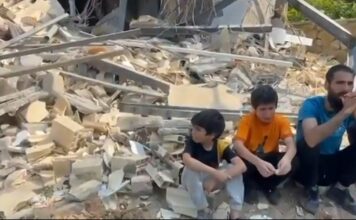By Ahmad Rafat
Saman Taherpour, an Iranian artist, designer, and entrepreneur based in Gothenburg, Sweden, and the founder of Kiani Concept company, has received death threats from individuals claiming to represent the Office of the President of Iran.
In response to the telephone threats, the Swedish police, and the Swedish Security Service (SAPO) intervened to ensure the safety of the Iranian-born designer. They advised Mr. Taherpour to adhere to security protocols to safeguard his life and well-being.
These threats have caused significant concern and distress for Taherpour, whose work is deeply rooted in his cultural heritage and reflects a profound appreciation for Iran’s rich history.
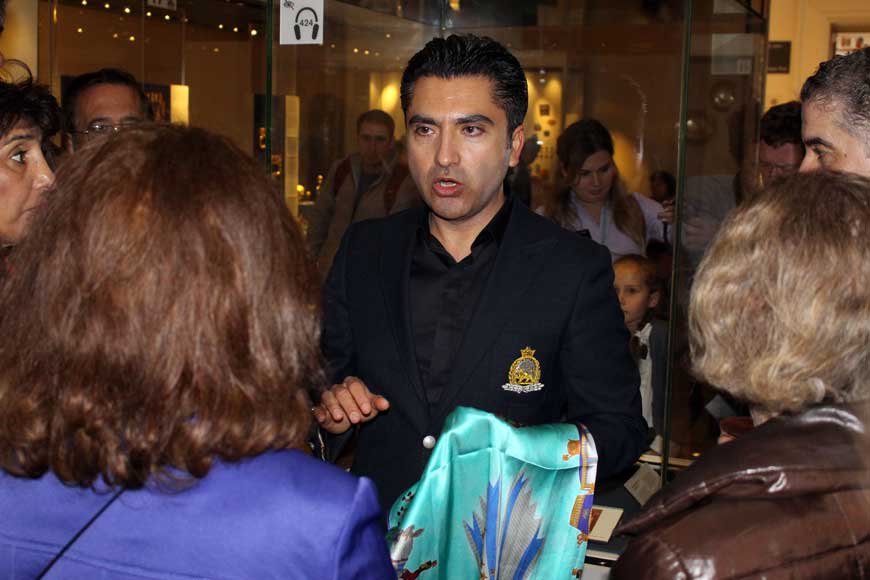
The Iranian security agencies have also summoned and questioned Taherpour’s associates in Tehran, prompting him to speak out about the intimidation he, his family, and his associates have faced. Although the nature and specifics of these threats have not been detailed publicly, they were reportedly linked to Taherpour’s involvement in protest rallies against the Islamic Republic.
A Swedish source who asked to remain anonymous told Kayhan Life that Saman Taherpour is not the sole Iranian individual who has recently received threatening phone calls from the Islamic Republic. The source said Swedish law enforcement and security agencies were deeply concerned about these threats and consider them highly significant.
SAPO has released to the media three minutes of the 17-minute phone conversation between Taherpour and the individual claiming to represent the Office of the President of Iran.
The Swedish evening newspaper Expressen published a segment of that conversation. According to Expressen, the exchange starts formally but escalates into a more aggressive tone.
The man, reportedly representing the Iranian President’s Office, starts the conversation by accusing Taherpour of “committing offenses against the country’s security and violating the Islamic Republic’s regulations.”
He notes “Taherpour’s participation in public gatherings overseas, holding a leadership position, and that his associates have provided incriminating photographs.”
While mentioning the Iranian government’s “tendency to show leniency towards Iranians abroad if they show regret and adhere to prescribed guidelines,” the man implies consequences for Taherpour’s actions.
When Taherpour interprets the call as a “direct threat,” the man denies it, stating that “there is now a case regarding Taherpour’s alleged activities against national security.” He says: “Taherpour and his family are under scrutiny and surveillance.”
Taherpour recently spoke to Kayhan Life about the threats he had received from an individual who claimed to represent the Iranian President’s administration.
Can you explain briefly why you were threatened and what they wanted?
A few weeks ago, the [Islamic Republic] authorities summoned one of my associates in Iran. They got some information about me.
Subsequently, the Iranian Intelligence Ministry, i.e., the Presidential Administration of Iran, contacted one of my associates in Sweden to get more information about me. However, my relative only spoke to the person for a short time and informed me about the incident.
I expected the Iranian authorities to contact me, so I was prepared when they eventually did and recorded the conversation. Someone named Mahdavi contacted me, claiming to be from the Presidential Administration of Iran.
He said I was a leader of protests abroad, including those held in Gothenburg, Stockholm, and other European locations, spreading propaganda against the Islamic Republic system.
He did not elaborate, but only mentioned my brand, which is Iranian-centric and focuses primarily on the Pahlavi dynasty. He concentrated on what he described as activities against the Islamic Republic regime.
The conversation lasted close to 17 minutes. It started with a calm tone, during which the individual listed the offenses and noted that a court hearing would be held for me soon in Iran.
I decided I needed to stand up to them with resolve. I explained that not only me but many Iranians had started these activities, including the struggle for toppling the Islamic Republic, and will continue these efforts.
I cannot go into the details of the conversation, which lasted approximately 17 minutes. However, the Swedish Security Service has allowed three minutes of that conversation to be available to the media.
They threatened my family, associates, and me. He explained that they had many people in Sweden who could harm me. He gave specific details about my work, my house’s description, and other information.
The 17-minute conversation included other topics that I cannot discuss here. In conclusion, I was told that they would come to Sweden and take me back to Iran, where I would have to explain my comments.
Within an hour after the call, I filed a complaint at a police station. Half an hour after I had filed my complaint with the police, the Swedish Security Service, known as SAPO, contacted me.
My meeting with SAPO lasted for several hours. I provided them with detailed information about the phone conversation and other related events. They launched an investigation, saying that no information about the incident should be made public without their authorization.
About a week to 10 days later, reporters and film crews from several major Swedish news networks, including TV4, Expressen newspaper, and other newspapers, started pursuing the story. They got permission to broadcast three minutes of the 17-minute phone conversation.
A lengthy investigation occurred before the incident was reported in the media. The Swedish authorities asked if I wanted the incident to become public.
Last year, the Swedish Security Service’s report showed that the Islamic Republic, China, and Russia posed the most significant threats to people in Sweden.
According to the report, many Iranians in Sweden received threats from the Islamic Republic’s security agencies. Many people report the threats to the police but understandably do not wish for the incident to be reported by the media, fearing for the safety of their families and because they travel to Iran, which enables the Islamic Republic to continue with its threats.
The Swedish Security Service’s annual report explains this. In my meeting with them, SAPO explained that such incidents were daily occurrences. They welcomed my desire to share the story with the media.
After the investigations by various teams, which took between 10 and 12 days, the media reported the story in the past couple of days. Main Swedish TV networks covered the incident extensively.
How serious are these threats in the view of the Swedish Security Service officers you spoke with? How much do you need to look after your safety, and what security measures do you need to take?
I used to receive threats on social media because of my artistic activities, but I never took them seriously. However, the Swedish Security Service has taken the recent incident seriously, mainly because of the specific [threats] in the 17-minute conversation.
I must adhere to a series of security protocols. I am in daily contact with SAPO, especially after it was reported by the media worldwide. There are several [security] protocols that I cannot discuss. SAPO takes the incident extremely seriously.
In July 2022, a court in Stockholm found Iranian official Hamid Nouri guilty of ‘crimes against humanity,’ ‘war crimes,’ and ‘premeditated murder,’ sentencing him to life in prison. Nouri allegedly supervised the mass execution of political prisoners in the summer of 1988 when he was reportedly a deputy prosecutor at Iran’s Gohardasht Prison. Do you think the threats against you and other Iranians living in Sweden are related to Hamid Nouri’s trial and the fact that three appeal courts have upheld his life sentence?
I can speak about the rest of the conversation, beyond the three-minute segment published. I told the person on the phone that if they continued their actions, they would have the same fate as Hamid Nouri.
I also told the police and SAPO that I believed the incident was related to Hamid Nouri’s situation. I noted that the Islamic Republic had taken Belgian, German, and British hostages, and was now focused on Sweden.
I noted that although they had taken no Swedish hostages, anything was possible. I said the same thing to Swedish reporters. However, Swedish reporters did not focus on this, arguing that these were separate issues that concerned Iranians and about which Swedish and European communities knew little. They wanted to focus on the threats that the Islamic Republic posed to Sweden.
Do you think the fact that your designs are heavily influenced by and reference the pre-Islamic ruling system could have played a role in the threats against you?
I have had a prominent presence on social media through my artwork. Many people are interested in my art. I have always used my artwork as a voice to advance my struggle. I believe no one can do everything. Each person must use their specific ability to fight.
I knew I would receive threats one day. While I am pleased that my work has forced the Islamic Republic’s Presidential Office to react by issuing a formal threat against me, I also know that they [the Islamic Republic] do not [directly] commit an act, but it can hire others in Europe for not much money to carry out its harmful intentions.
The Swedish police explained this to me, stressing that although [the Islamic Republic] had this capability, the Swedish police would not let it happen, would stand up to them, and would safeguard freedom and democracy in Sweden.
Have the threats and the subsequent security protocols you must adhere to severely affected your professional and personal life?
It has made me think about a wide range of issues. I must inform SAPO about my whereabouts, places I visit, and people I meet all the time, which naturally affects my daily life. I focus on the successful results of my work and do not let the situation negatively affect me.
My life has changed, and I must be more vigilant.

